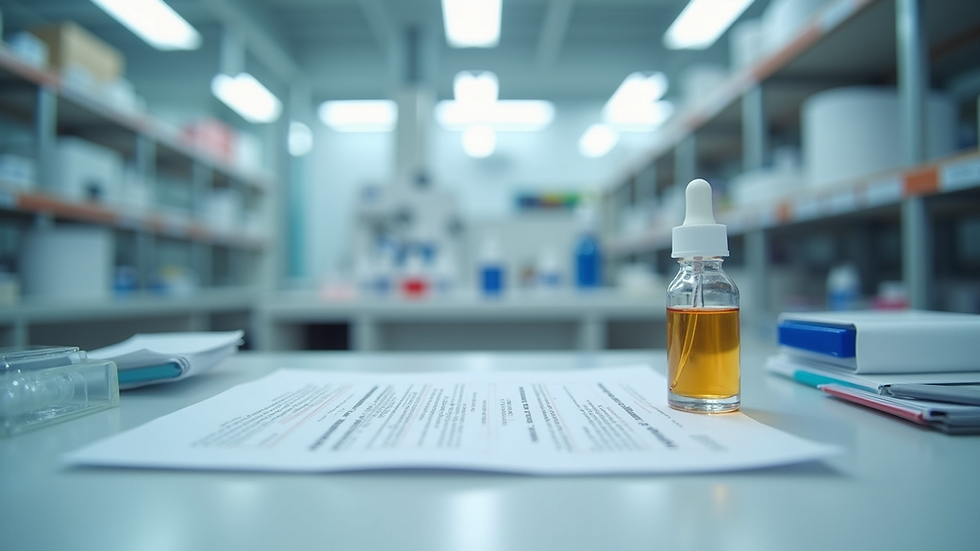Thriving as a Regulatory Affairs Specialist in Cosmetics
- Gill Westgate

- 20 hours ago
- 4 min read
Olivia Santoni
In the dynamic world of cosmetics and personal care, ensuring products meet stringent regulatory standards is not just a necessity but a cornerstone of success. As a regulatory affairs specialist, I have witnessed firsthand how mastering compliance can elevate a brand’s reputation and safeguard consumer trust. But what does it truly take to thrive in this role? How can professionals in the UK cosmetics industry navigate the complex web of regulations while fostering innovation and growth? This post aims to provide clear, practical insights into excelling as a cosmetics compliance expert.
Understanding the Role of a Cosmetics Compliance Expert
The cosmetics industry is governed by a myriad of regulations designed to protect consumers and ensure product safety. A cosmetics compliance expert acts as the bridge between regulatory requirements and product development, ensuring that every item launched adheres to legal standards. This role demands a deep understanding of legislation such as the UK Cosmetics Regulation, which aligns closely with the EU Cosmetics Regulation post-Brexit, as well as knowledge of labelling, ingredient restrictions, and safety assessments.
To thrive, one must be proactive in monitoring regulatory updates and interpreting how changes impact product portfolios. For example, when new restrictions on certain preservatives or UV filters are introduced, a compliance expert must swiftly assess existing formulations and advise on necessary modifications. This vigilance not only prevents costly recalls but also positions the company as a responsible market player.
Key responsibilities include:
Reviewing product formulations against banned or restricted substances lists.
Ensuring accurate and compliant product labelling.
Coordinating safety assessments and compiling Product Information Files (PIFs).
Liaising with regulatory bodies and certification agencies.
Training internal teams on compliance best practices.

Essential Skills for a Cosmetics Compliance Expert
Success in this field hinges on a blend of technical knowledge, analytical thinking, and communication skills. While understanding chemistry and toxicology is fundamental, the ability to interpret legal texts and translate them into actionable steps is equally critical. Moreover, collaboration across departments—from R&D to marketing—is necessary to ensure compliance does not stifle creativity but rather guides it responsibly.
Here are some essential skills to cultivate:
Attention to Detail: Regulatory documents are dense and complex. Missing a single clause can lead to non-compliance.
Problem-Solving: When regulations change, finding compliant alternatives or solutions requires creativity and resourcefulness.
Communication: Explaining regulatory requirements clearly to non-experts helps maintain alignment across teams.
Project Management: Managing timelines for product launches while ensuring compliance demands strong organisational skills.
Continuous Learning: The regulatory landscape evolves constantly; staying informed through seminars, workshops, and industry networks is vital.
For instance, when a new ingredient restriction is announced, a cosmetics compliance expert must quickly evaluate its impact, communicate with suppliers, and update internal protocols. This agility ensures the company remains competitive without compromising safety or legality.
What Degree Do You Need to Be a Regulatory Affairs Specialist?
Entering the field of cosmetics compliance typically requires a solid educational foundation in sciences. Degrees in chemistry, pharmaceutical sciences, biology, or related disciplines provide the technical background necessary to understand product formulations and safety data. However, specialised training in regulatory affairs can significantly enhance one’s expertise and employability.
Many universities and professional bodies offer postgraduate courses or certifications in regulatory affairs tailored to the cosmetics sector. These programs cover topics such as:
Regulatory frameworks and legislation.
Product safety and toxicology.
Quality management systems.
Risk assessment and management.
Documentation and submission processes.
For example, completing a diploma in regulatory affairs can equip you with the skills to navigate complex compliance requirements confidently. Additionally, gaining practical experience through internships or entry-level roles in regulatory departments can provide invaluable insights into day-to-day challenges and workflows.

Navigating Challenges and Embracing Opportunities
The cosmetics industry is fast-paced and innovation-driven, which can sometimes seem at odds with the meticulous nature of regulatory compliance. Yet, this tension presents unique opportunities for those who can balance both aspects effectively.
One common challenge is managing the introduction of novel ingredients or technologies that lack clear regulatory guidance. In such cases, a cosmetics compliance expert must engage with regulatory authorities, industry groups, and scientific experts to interpret potential implications and advocate for reasonable frameworks.
Moreover, Brexit has introduced additional complexity for UK-based companies, requiring careful attention to divergent regulations between the UK and EU markets. Staying connected with networks like Cosmetics Cluster UK can provide timely updates and collaborative problem-solving platforms.
On the positive side, compliance expertise can be a powerful differentiator. Brands that demonstrate transparency, safety, and adherence to regulations often enjoy enhanced consumer trust and loyalty. Furthermore, compliance can drive innovation by encouraging the development of safer, more sustainable products that meet evolving consumer expectations.
Practical tips to thrive include:
Build strong relationships with suppliers and regulatory bodies to facilitate smooth information exchange.
Invest in ongoing training to keep abreast of regulatory changes and emerging trends.
Leverage technology such as compliance management software to streamline documentation and tracking.
Participate in industry forums to share knowledge and influence regulatory developments.
Adopt a proactive mindset that views compliance as an enabler rather than a barrier.

Looking Ahead: The Future of Cosmetics Compliance
As consumer awareness and regulatory scrutiny continue to rise, the role of a cosmetics compliance expert will only grow in importance. Emerging trends such as sustainability, clean beauty, and digital labelling are reshaping the regulatory landscape, demanding adaptability and foresight.
For example, regulations around environmental impact and packaging waste are becoming more stringent, requiring compliance professionals to integrate ecological considerations into their assessments. Similarly, the rise of e-commerce and global distribution channels introduces new challenges in ensuring consistent compliance across jurisdictions.
By embracing these changes and fostering a culture of continuous improvement, cosmetics compliance experts can help their organisations not only meet regulatory demands but also lead the industry towards a safer, more responsible future.
In conclusion, thriving as a cosmetics compliance expert involves a combination of solid scientific knowledge, regulatory acumen, and strategic collaboration. It is a role that offers both challenges and rewards, with the potential to make a meaningful impact on product safety, consumer confidence, and industry innovation. For those willing to invest in their skills and stay engaged with the evolving landscape, the opportunities are abundant and promising.
Please go to our members page to find details of members who can offer consultancy and support.




Comments